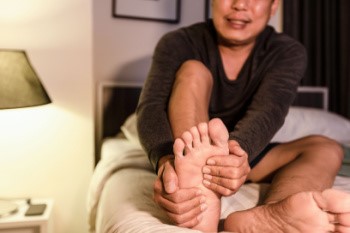

Diagnosing Achilles tendon ruptures involves a combination of clinical evaluation and imaging tests. The Achilles tendon, the largest tendon in the body, connects the calf muscles to the heel bone. A rupture occurs when this tendon tears, often due to sudden or forceful movements during sports or activities that place excessive stress on the tendon. Symptoms of an Achilles tendon rupture typically include a sudden, sharp pain in the back of the ankle or calf, accompanied by swelling and difficulty walking or standing on tiptoe. While this injury can happen to anyone, factors such as age, sports participation, and pre-existing foot problems like flat feet or tendonitis may increase the risk. Treatment options include conservative measures like immobilization to more advanced options, like surgical repair for severe cases. If you have injured your Achilles tendon, it is strongly suggested that you schedule an appointment with a podiatrist for an accurate diagnosis and treatment plan.
Achilles tendon injuries need immediate attention to avoid future complications. If you have any concerns, contact Dr. Robert Hope of Riverside Podiatry. Our doctor can provide the care you need to keep you pain-free and on your feet.
What Is the Achilles Tendon?
The Achilles tendon is a tendon that connects the lower leg muscles and calf to the heel of the foot. It is the strongest tendon in the human body and is essential for making movement possible. Because this tendon is such an integral part of the body, any injuries to it can create immense difficulties and should immediately be presented to a doctor.
What Are the Symptoms of an Achilles Tendon Injury?
There are various types of injuries that can affect the Achilles tendon. The two most common injuries are Achilles tendinitis and ruptures of the tendon.
Achilles Tendinitis Symptoms
Rupture Symptoms
Treatment and Prevention
Achilles tendon injuries are diagnosed by a thorough physical evaluation, which can include an MRI. Treatment involves rest, physical therapy, and in some cases, surgery. However, various preventative measures can be taken to avoid these injuries, such as:
If you have any questions please feel free to contact our office located in Tuscaloosa, and Fayette, AL . We offer the newest diagnostic tools and technology to treat your foot and ankle needs.
 Peripheral neuropathy, a complication of diabetes, occurs when high levels of fats or sugar in the blood damage nerves throughout the body, particularly in the extremities like the feet and hands. Symptoms include numbness, tingling, pain, and loss of sensation in these areas. Peripheral neuropathy often progresses gradually and can be unnoticed until its more advanced stages. Diagnosis involves a thorough physical examination by a podiatrist to assess reflexes, sensation loss, and skin changes. Additional tests like electromyograms, EMG, or nerve conduction velocity tests, abbreviated NCV, may be required for confirmation. While there is no cure for peripheral neuropathy, managing blood sugar levels is the best way to slow its progression. Treatment focuses on alleviating symptoms and preventing complications, such as ulcers. It is important to seek care from a podiatrist, a doctor who specializes in foot and ankle health, for comprehensive management of peripheral neuropathy. To help maintain mobility and prevent complications like ulcers and amputations, it is suggested that you include a podiatrist in your medical team.
Peripheral neuropathy, a complication of diabetes, occurs when high levels of fats or sugar in the blood damage nerves throughout the body, particularly in the extremities like the feet and hands. Symptoms include numbness, tingling, pain, and loss of sensation in these areas. Peripheral neuropathy often progresses gradually and can be unnoticed until its more advanced stages. Diagnosis involves a thorough physical examination by a podiatrist to assess reflexes, sensation loss, and skin changes. Additional tests like electromyograms, EMG, or nerve conduction velocity tests, abbreviated NCV, may be required for confirmation. While there is no cure for peripheral neuropathy, managing blood sugar levels is the best way to slow its progression. Treatment focuses on alleviating symptoms and preventing complications, such as ulcers. It is important to seek care from a podiatrist, a doctor who specializes in foot and ankle health, for comprehensive management of peripheral neuropathy. To help maintain mobility and prevent complications like ulcers and amputations, it is suggested that you include a podiatrist in your medical team.
Neuropathy
Neuropathy can be a potentially serious condition, especially if it is left undiagnosed. If you have any concerns that you may be experiencing nerve loss in your feet, consult with Dr. Robert Hope of Riverside Podiatry. Our doctor will assess your condition and provide you with quality foot and ankle treatment for neuropathy.
What Is Neuropathy?
Neuropathy is a condition that leads to damage to the nerves in the body. Peripheral neuropathy, or neuropathy that affects your peripheral nervous system, usually occurs in the feet. Neuropathy can be triggered by a number of different causes. Such causes include diabetes, infections, cancers, disorders, and toxic substances.
Symptoms of Neuropathy Include:
Those with diabetes are at serious risk due to being unable to feel an ulcer on their feet. Diabetics usually also suffer from poor blood circulation. This can lead to the wound not healing, infections occurring, and the limb may have to be amputated.
Treatment
To treat neuropathy in the foot, podiatrists will first diagnose the cause of the neuropathy. Figuring out the underlying cause of the neuropathy will allow the podiatrist to prescribe the best treatment, whether it be caused by diabetes, toxic substance exposure, infection, etc. If the nerve has not died, then it’s possible that sensation may be able to return to the foot.
Pain medication may be issued for pain. Electrical nerve stimulation can be used to stimulate nerves. If the neuropathy is caused from pressure on the nerves, then surgery may be necessary.
If you have any questions please feel free to contact our offices located in Tuscaloosa, and Fayette, AL. We offer the newest diagnostic and treatment technologies for all your podiatric needs.
 Heel spur surgery stands as a significant decision for those grappling with persistent heel pain. Understanding the procedure's intricacies unveils vital insights. The surgery involves excising the bony protrusion from the heel bone, often performed under local or general anesthesia. It typically necessitates a recovery period, during which mobility may be limited, demanding patience and adherence to post-operative instructions. Complications such as infection or nerve damage, though rare, underscore the importance of meticulous post-operative care. The decision to undergo surgery hinges on various factors, including the severity of symptoms and the efficacy of non-surgical interventions. Consulting with a podiatrist is essential for informed decision-making, as they can provide tailored guidance based on individual circumstances. While heel spur surgery offers relief for many, it is important to approach it with a thorough understanding of the process, potential outcomes, and commitment to recovery. If you have a heel spur that is causing pain, it is strongly suggested that you confer with a podiatrist who can determine if heel spur surgery is right for you.
Heel spur surgery stands as a significant decision for those grappling with persistent heel pain. Understanding the procedure's intricacies unveils vital insights. The surgery involves excising the bony protrusion from the heel bone, often performed under local or general anesthesia. It typically necessitates a recovery period, during which mobility may be limited, demanding patience and adherence to post-operative instructions. Complications such as infection or nerve damage, though rare, underscore the importance of meticulous post-operative care. The decision to undergo surgery hinges on various factors, including the severity of symptoms and the efficacy of non-surgical interventions. Consulting with a podiatrist is essential for informed decision-making, as they can provide tailored guidance based on individual circumstances. While heel spur surgery offers relief for many, it is important to approach it with a thorough understanding of the process, potential outcomes, and commitment to recovery. If you have a heel spur that is causing pain, it is strongly suggested that you confer with a podiatrist who can determine if heel spur surgery is right for you.
Foot surgery is sometimes necessary to treat a foot ailment. To learn more, contact Dr. Robert Hope of Riverside Podiatry. Our doctor will assist you with all of your foot and ankle needs.
When Is Surgery Necessary?
Foot and ankle surgery is generally reserved for cases in which less invasive, conservative procedures have failed to alleviate the problem. Some of the cases in which surgery may be necessary include:
What Types of Surgery Are There?
The type of surgery you receive will depend on the nature of the problem you have. Some of the possible surgeries include:
Benefits of Surgery
Although surgery is usually a last resort, it can provide more complete pain relief compared to non-surgical methods and may allow you to finally resume full activity.
Surgical techniques have also become increasingly sophisticated. Techniques like endoscopic surgery allow for smaller incisions and faster recovery times.
If you have any questions please feel free to contact our offices located in Tuscaloosa, and Fayette, AL. We offer the newest diagnostic and treatment technologies for all your podiatric needs.
Read More About Foot Surgery